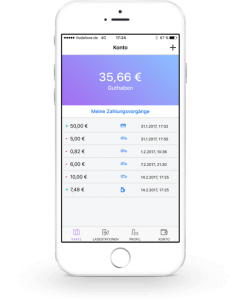
Share&Charge, a decentralized marketplace that connects electric vehicle owners with private and public charging stations, has released its mobile app, available now in both the Google Play Store and the Apple App Store. The platform, which already has over 1,000 charging stations listed in Germany, seeks to support the concept of the sharing economy.
 In Germany, about 92% of the 45,150 electric vehicle owners have a charging station at home. Share&Charge allows these individuals to rent their home charging stations in a peer-to-peer fashion.
In Germany, about 92% of the 45,150 electric vehicle owners have a charging station at home. Share&Charge allows these individuals to rent their home charging stations in a peer-to-peer fashion.
Through the platform, private charging stations can independently determine the charging method and the price of their electricity service, while electric vehicle owners can search for the next charging station on an interactive map.
Share&Charge uses the Ethereum blockchain as a transaction layer. On Share&Charge, transactions are handled in a “crypto-euros” that is backed with real euros held in escrow.
At the moment, the token cannot be traded and is reserved for use exclusively within the Share&Charge project. However, an e-money license being sought by XTECH, a payment provider part of the project, could see its use extended to it to other fields, according to Stephan Tual, the founder of Slock.it, a blockchain startup that helped develop the platform.
All Share&Charge users – charging station owners and electric vehicle drivers – are given a Share&Charge wallet, which holds real-time information about all transactions.
Money can be cashed-in using credit card, PayPal or Sofortüberweisung, an online payment system, and cashed-out using SEPA transactions.
“We hope that in the future, once the smart contract system is battle-proven and bug free, Share&Charge will be able […] to create a truly decentralized market for electric vehicle charging,” Tual wrote in a blog announcement.
Moving forward, Tual said the team intends to “extend this concept to bring value to operators of mobility services, to easily share or rent their mobility assets, including energy, parking spots, and eventually the vehicles themselves.”
Share&Charge is the first product from a soon-to-be-launched Innogy Innovation Hub startup called MotionWerk. Innogy is a subsidiary of RWE, Germany’s second largest energy group.
“Share&Charge has a clear vision of the future of driving: it is electric, autonomous and follows the sharing concept. The entire automotive market structure and related energy industry is changing,” said Dietrich Sümmermann, co-founder of Share&Charge and head of B2C enablement, Smart and Connected Lighthouse at RWE.
“Cars with combustion engines need a central service station – but thanks to e-mobility, such infrastructure monopolies will soon become history. They will be replaced by hundreds of plug-in sockets. With Share&Charge, we are pursuing clear goals.”
Within one year, the startup hopes to become one of the top five infrastructure providers for charging stations in Germany.
Alongside Share&Charge, Innogy is also involved in another blockchain project called Car eWallet. At the Consumer Electronics Show (CES) in January, the company presented a prototype it had developed with partners ZF and UBS.
Car eWallet is a new car payment system using blockchain that allows users to pay on-the-go for highway tolls, parking fees and electric charging. It also lets users collect fees for car-sharing or delivery services.
The projects are part of RWE’s broader plan to use blockchain to transform the e-mobility industry and bring down costs through use of the technology for authentication and billing.
The firm sees the technology as an integral part of a new series of technologies to be introduced to its core businesses.
German blockchain startup Slock.it is most known for its involvement with The DAO, a project that emerged last year that sought to create a decentralized venture capital fund running on the Ethereum blockchain.
The DAO raised US$162 million through a crowdsale and was subsequently targeted by a hacker who exploited a vulnerability in the smart contract allowing them to steal US$60 million worth of ether. The funds were recouped only by engineering a controversial rollback of the Ethereum ledger.
Despite The DAO failure, Slock.it has remained active in the blockchain and Internet-of-Things space. In March, the company raised US$2 million in seed funding to develop the Universal Sharing Network (USN). The project seeks to revamp the sharing economy by enabling companies and individuals to exchange ownership of objects connected to the Internet-of-Things.

